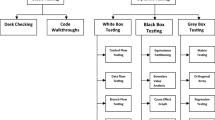Abstract
Producing high-quality software has been one of the greatest challenges of the development market in the last few years. The software testing is the essence of the quality assurance, but the implementation of this activity is still difficult due to may factors. This paper presents some factors that influence on the adoption of a testing process. Some of these factors were outlined in the literature, and others were selected empirically based on the work experience obtained in a large company. We present the results obtained in the experiments that compare the software testing performance when implemented considering a formal testing process and when carried out in an ad-hoc way.
Access this chapter
Tax calculation will be finalised at checkout
Purchases are for personal use only
Preview
Unable to display preview. Download preview PDF.
Similar content being viewed by others
References
Rodrigues., A., Pinheiro, P., Rodrigues, M.M., et al.: Towards the Selection of Testable Use Cases and a Real Experience. In: Second World Summit on the Knowledge Society, WSKS 2009, Grécia. Best Practices for the Knowledge Society. Knowledge, Learning, Development and Technology for All, vol. 49, pp. 513–521 (2009)
Rodrigues, A., Pinheiro, P., Albuquerque, A.B.: The definiton of a testing process to small sized companies: the Brazilian scenario. In: Proceedings of the International Conference on the Quality of Information and Communications Technology (QUATIC), Porto (2010)
Rodrigues, A., Pinheiro, P., Rodrigues, M.M., et al.: Applying a multicriteria model for selection of test use cases: a use of experience. International Journal Social and Humanistic Computing 1, 246–260 (2010)
Bahulkar, A., Kelkar, R.: Opportunities in System testing. In: Testing: Academic and Industrial Conference Practice and Research Techniques - mutation (taicpart-mutation 2007), p.133 (2007)
CMMI – Capability Maturity Model Integration, http://www.cmmi.de/cmmi_v1.2/browser.html
Ryu, H., Ryu, D.-K., Baik, J.: A Strategic Test Process Improvement Approach Using an Ontological Description for MND-TMM. In: Seventh IEEE/ACIS International Conference on Computer and Information Science (ICIS 2008), pp. 561–566 (2008)
Londesbrough, I.: A Test Process for all Lifecycles. In: IEEE International Conference on Software Testing Verification and Validation Workshop (ICSTW) pp. 328–331 (2008)
Maldonado, J.C.: Critérios Potenciais Usos: Uma Construção ao Teste Estrutural de Software. Tese de Doutorado, DCA/FEE/UNICAMP, Campinas, SP (1991)
Smith, M., Thompson, N.: The Keystone to Support a Generic Test Process: icstw. In: IEEE International Conference on Software Testing Verification and Validation Workshop, pp. 343–353 (2008)
MPS.BR – Melhoria no Processo de Desenvolvimento de Software, http://www.softex.br/mpsbr/_home/default.asp
NBR ISO 9001 - Associação Brasileira de Normas Técnicas.– Sistema de Gestão da Qualidade – Requisitos, Rio de Janeiro (2008), http://www.abnt
Rational Unified Process®. Rational Software Corporation. Versão 2002.05.00. Copyright © (1987 – 2001)
SEI, Capability Maturity Model Integration, Version 1.1 Staged Representation (2002), http://www.sei.cmu.edu
Yuan, Y., Gu, S.: Research and Establishment of Quality Cost Oriented Software Testing Model. In: Canadian Conference on Electrical and Computer Engineering, CCECE 2006, pp. 2410–2415 (2006)
Weimin, Z., Bosheng, Z., Wenjie, L.: Model-Based Time Estimate of Software Test Processes. In: International Conference on Wireless Communications, Networking and Mobile Computing, WiCom 2007, pp. 4946–4949 (2007)
Author information
Authors and Affiliations
Editor information
Editors and Affiliations
Rights and permissions
Copyright information
© 2010 Springer-Verlag Berlin Heidelberg
About this paper
Cite this paper
Rodrigues, A., Bessa, A., Pinheiro, P.R. (2010). Barriers to Implement Test Process in Small-Sized Companies. In: Lytras, M.D., Ordonez de Pablos, P., Ziderman, A., Roulstone, A., Maurer, H., Imber, J.B. (eds) Organizational, Business, and Technological Aspects of the Knowledge Society. WSKS 2010. Communications in Computer and Information Science, vol 112. Springer, Berlin, Heidelberg. https://doi.org/10.1007/978-3-642-16324-1_25
Download citation
DOI: https://doi.org/10.1007/978-3-642-16324-1_25
Publisher Name: Springer, Berlin, Heidelberg
Print ISBN: 978-3-642-16323-4
Online ISBN: 978-3-642-16324-1
eBook Packages: Computer ScienceComputer Science (R0)




